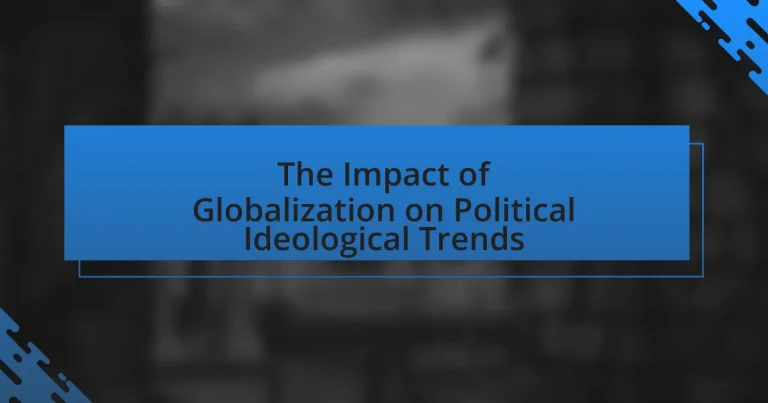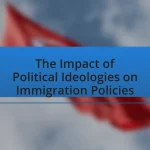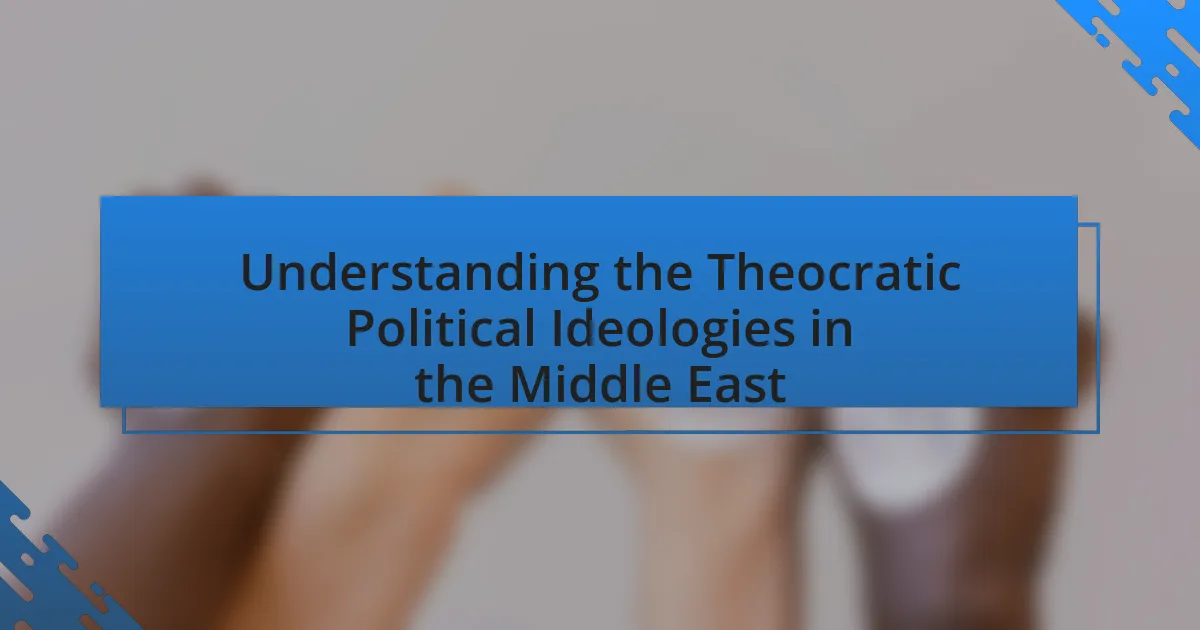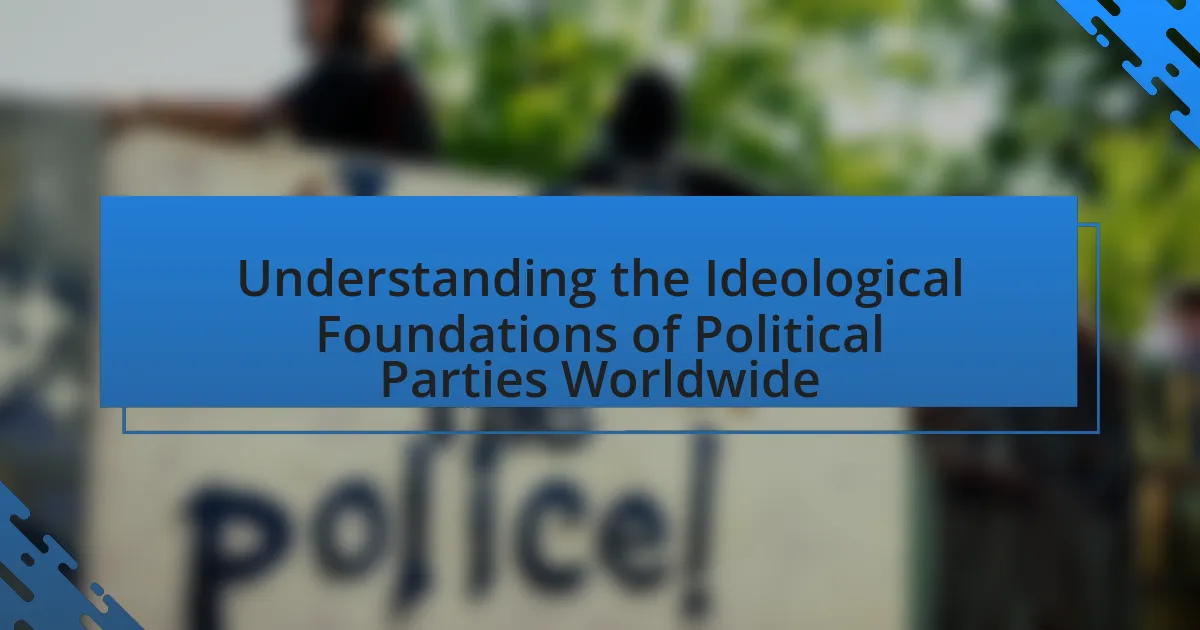The article examines the impact of globalization on political ideological trends, highlighting how it promotes the spread of liberal democratic values while also fostering nationalist and populist movements in response to economic and cultural anxieties. Key factors influencing these trends include economic interdependence, cultural exchange, and technological advancements, which shape public opinion and political mobilization. The article also discusses the historical contexts that inform these dynamics, the role of emerging economies, and the future implications of globalization on political ideologies, emphasizing the need for inclusive dialogue and adaptive policymaking to navigate the evolving political landscape.
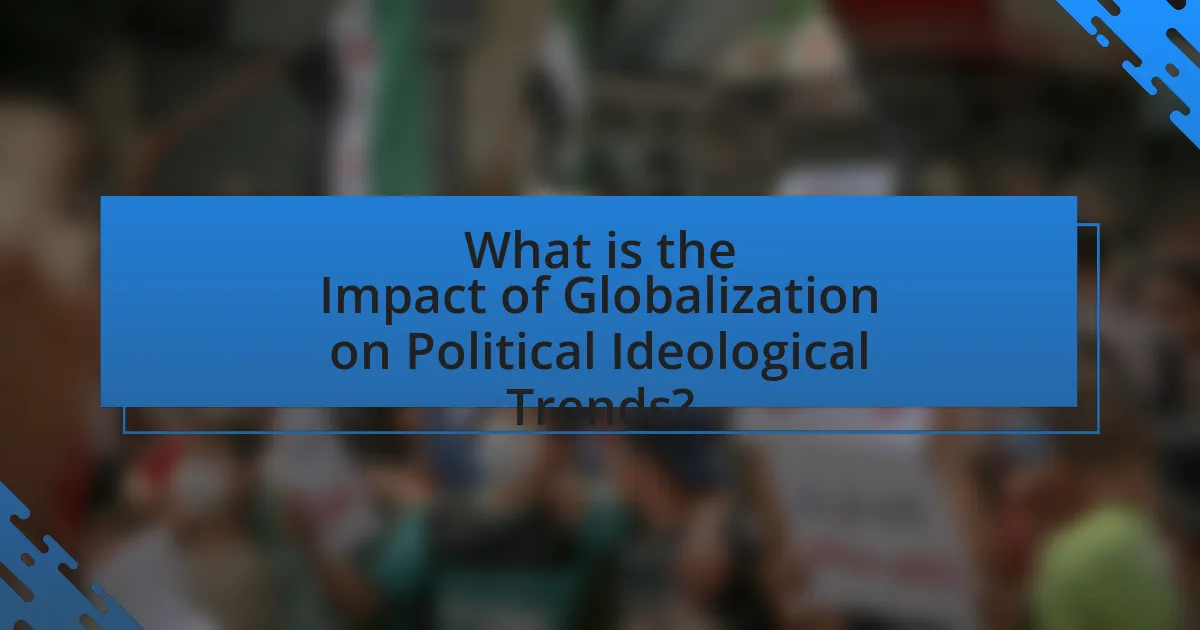
What is the Impact of Globalization on Political Ideological Trends?
Globalization significantly influences political ideological trends by promoting the spread of liberal democratic values and increasing the interconnectedness of nations. This interconnectedness often leads to the diffusion of ideas, such as human rights and free-market principles, which can challenge authoritarian regimes and traditional political structures. For instance, the rise of global communication networks has facilitated grassroots movements advocating for democracy, as seen during the Arab Spring, where social media played a crucial role in mobilizing protests against oppressive governments. Additionally, globalization can exacerbate tensions between nationalist and globalist ideologies, as seen in the backlash against immigration and trade policies in various countries, leading to the rise of populist movements. These dynamics illustrate how globalization reshapes political landscapes by fostering both cooperation and conflict among differing ideological perspectives.
How does globalization influence political ideologies worldwide?
Globalization influences political ideologies worldwide by promoting the exchange of ideas, values, and practices across borders, leading to the emergence of hybrid political systems. This phenomenon is evident in the spread of democratic ideals and human rights, which have gained traction in various regions due to global communication networks and international organizations advocating for these principles. For instance, the Arab Spring demonstrated how social media facilitated the dissemination of democratic ideals, prompting political movements in countries like Tunisia and Egypt. Additionally, globalization has led to the rise of populism in response to perceived threats from global economic integration, as seen in the United States and parts of Europe, where leaders have capitalized on nationalist sentiments to challenge established political norms. These examples illustrate how globalization reshapes political ideologies by fostering both convergence towards liberal democracy and divergence through nationalist and populist reactions.
What are the key factors of globalization affecting political thought?
The key factors of globalization affecting political thought include economic interdependence, cultural exchange, technological advancement, and the rise of transnational governance. Economic interdependence leads to the integration of markets, which influences national policies and political ideologies, as seen in the shift towards neoliberalism in many countries since the late 20th century. Cultural exchange fosters the spread of ideas and values, contributing to the emergence of cosmopolitanism and multiculturalism in political discourse. Technological advancement, particularly in communication, enables rapid dissemination of information, shaping public opinion and political mobilization, exemplified by the role of social media in political movements like the Arab Spring. Lastly, the rise of transnational governance challenges traditional state sovereignty, prompting new political frameworks that address global issues such as climate change and human rights, as evidenced by international agreements like the Paris Accord.
How do cultural exchanges shape political ideologies?
Cultural exchanges shape political ideologies by facilitating the transfer of ideas, values, and practices between different societies, which can lead to the evolution or transformation of political beliefs. For instance, the spread of democratic ideals through cultural exchanges, such as the influence of Western media and education in non-Western countries, has contributed to the rise of democratic movements globally. Historical examples include the impact of the Enlightenment on revolutionary movements in France and America, where shared philosophical ideas about liberty and equality inspired political change. Additionally, cultural exchanges can challenge existing political structures by introducing alternative viewpoints, as seen in the Arab Spring, where social media facilitated the sharing of democratic ideals and mobilized protests against authoritarian regimes.
Why is understanding the impact of globalization on political ideologies important?
Understanding the impact of globalization on political ideologies is important because it shapes how nations and societies interact, influencing governance, policy-making, and public opinion. Globalization facilitates the exchange of ideas, leading to the emergence of new political movements and the transformation of existing ideologies. For instance, the rise of populism in various countries can be linked to economic disparities exacerbated by global trade practices, as highlighted in the research by Rodrik (2018) in “Globalization and Its Discontents Revisited.” This research demonstrates that globalization can lead to a backlash against established political ideologies, prompting shifts in voter behavior and party alignment. Thus, comprehending these dynamics is crucial for policymakers and political analysts to navigate the evolving landscape of global politics effectively.
What historical contexts provide insight into this relationship?
The historical contexts that provide insight into the relationship between globalization and political ideological trends include the post-World War II era, the Cold War, and the rise of neoliberalism in the late 20th century. After World War II, the establishment of international institutions like the United Nations and the Bretton Woods system facilitated economic interdependence, which influenced political ideologies towards liberal democracy and capitalism. During the Cold War, the ideological battle between capitalism and communism shaped global political alignments and responses to globalization, as countries navigated their positions between these two dominant ideologies. The rise of neoliberalism in the 1980s, characterized by deregulation, privatization, and free-market policies, further transformed political ideologies worldwide, leading to a shift towards market-oriented governance and a reduction in state intervention in economies. These historical contexts illustrate how globalization has been intertwined with the evolution of political ideologies, shaping national policies and international relations.
How do political movements adapt to globalization?
Political movements adapt to globalization by leveraging digital communication, forming transnational networks, and addressing global issues. The rise of the internet and social media allows movements to disseminate information rapidly, mobilize supporters across borders, and share strategies. For instance, the Arab Spring demonstrated how social media facilitated the organization of protests and the spread of democratic ideals in multiple countries simultaneously. Additionally, political movements increasingly focus on global challenges such as climate change and human rights, aligning their agendas with international frameworks to gain broader support. This adaptation is evident in organizations like Greenpeace and Amnesty International, which operate globally to influence policy and public opinion.
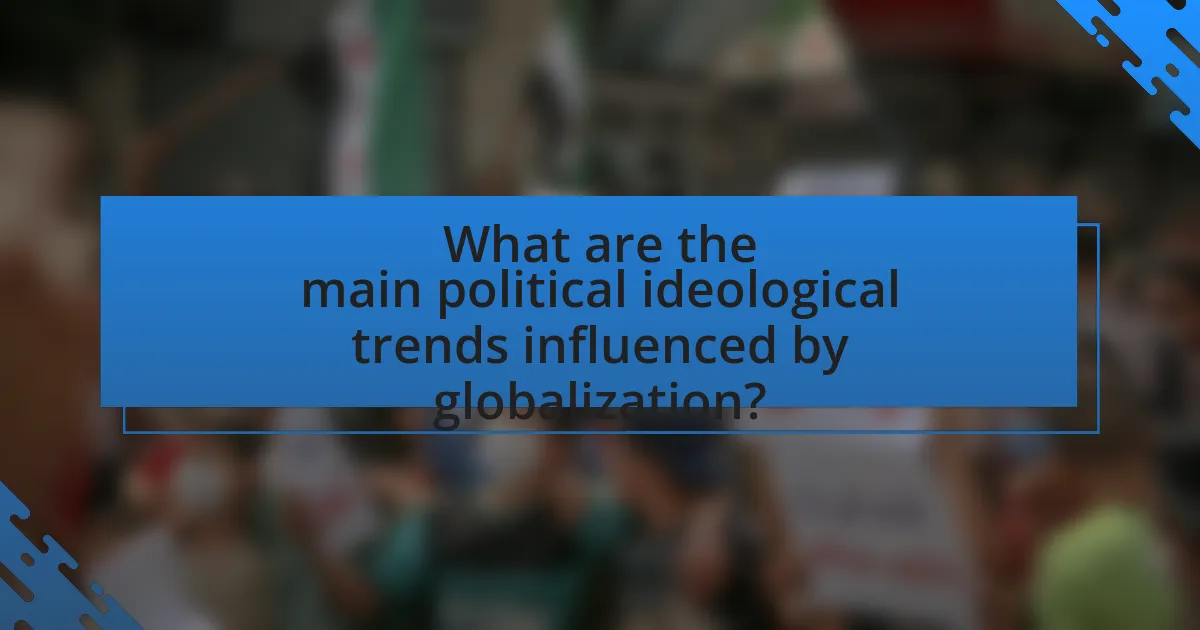
What are the main political ideological trends influenced by globalization?
The main political ideological trends influenced by globalization include the rise of neoliberalism, the resurgence of nationalism, and the emergence of transnationalism. Neoliberalism has gained prominence as countries adopt free-market policies and deregulation, emphasizing individual entrepreneurship and global trade. Nationalism has seen a resurgence as some nations react against globalization, prioritizing sovereignty and local identity, often leading to protectionist policies. Transnationalism reflects the interconnectedness of global issues, fostering ideologies that transcend national borders, such as environmentalism and human rights advocacy. These trends illustrate how globalization reshapes political ideologies, driving both integration and fragmentation in the global political landscape.
How has globalization affected liberalism and conservatism?
Globalization has significantly influenced both liberalism and conservatism by promoting interconnectedness and challenging traditional national boundaries. For liberalism, globalization has facilitated the spread of democratic ideals, human rights, and free markets, leading to increased advocacy for global governance and international cooperation. This is evidenced by the rise of international organizations such as the United Nations and the World Trade Organization, which promote liberal values across nations.
Conversely, globalization has posed challenges for conservatism, as it often emphasizes cultural homogenization and economic competition, which can undermine national sovereignty and traditional values. The backlash against globalization has led to a resurgence of nationalist and populist movements, as seen in various countries where conservative parties have gained traction by advocating for protectionist policies and stricter immigration controls. This dynamic illustrates how globalization has reshaped the landscape of political ideologies, pushing liberalism towards a more global perspective while prompting conservatism to react defensively to perceived threats to national identity and autonomy.
What changes have occurred in liberal ideologies due to globalization?
Globalization has led to significant changes in liberal ideologies, primarily by promoting a more interconnected and interdependent world that emphasizes individual rights, free markets, and democratic governance. As nations engage in global trade and communication, liberal ideologies have adapted to prioritize economic liberalization, advocating for policies that support free trade and open markets, which are seen as essential for economic growth and development.
Moreover, globalization has facilitated the spread of democratic values and human rights, leading to a stronger emphasis on civil liberties and social justice within liberal thought. This shift is evidenced by the increasing global movements for equality and human rights, which have gained traction through international cooperation and advocacy.
Additionally, the rise of transnational issues, such as climate change and migration, has prompted liberal ideologies to incorporate a more global perspective, recognizing the need for collective action and international governance to address these challenges. This evolution reflects a broader understanding of how local policies are influenced by global dynamics, thereby reshaping the traditional boundaries of liberalism.
How have conservative ideologies responded to global influences?
Conservative ideologies have responded to global influences by emphasizing nationalism, traditional values, and skepticism towards international institutions. This response is evident in the rise of populist movements across various countries, where leaders advocate for policies that prioritize domestic interests over global cooperation. For instance, the Brexit campaign in the United Kingdom highlighted a desire to reclaim sovereignty from the European Union, reflecting a broader trend among conservatives to resist globalization in favor of national autonomy. Additionally, conservative parties in the United States have increasingly criticized multilateral agreements, arguing that they undermine national interests and economic independence. This shift illustrates a significant adaptation of conservative thought in reaction to perceived threats posed by global interconnectedness.
What role do emerging economies play in shaping political ideologies?
Emerging economies significantly influence the shaping of political ideologies by introducing new perspectives and practices that challenge established norms. These economies, such as Brazil, India, and China, often prioritize economic growth and development, which can lead to the adoption of pragmatic governance models that blend elements of capitalism with social welfare. For instance, China’s unique blend of state capitalism and authoritarian governance has prompted discussions about the viability of alternative political models, influencing ideologies in both developed and developing nations. Additionally, the rise of these economies has shifted global power dynamics, encouraging a multipolar world where diverse political ideologies coexist and compete, as evidenced by the increasing prominence of BRICS nations in international forums. This competition fosters ideological innovation and adaptation, as countries reassess their political frameworks in response to the successes and challenges faced by emerging economies.
How do the political ideologies of emerging economies differ from developed nations?
The political ideologies of emerging economies often emphasize state intervention and developmentalism, contrasting with the liberal democratic frameworks prevalent in developed nations. Emerging economies frequently prioritize economic growth and social equity, leading to ideologies that support strong government roles in the economy, as seen in countries like Brazil and India, where policies focus on poverty alleviation and industrialization. In contrast, developed nations typically advocate for free-market principles and individual liberties, as evidenced by the policies of the United States and many European countries, which emphasize deregulation and privatization. This divergence is rooted in differing historical contexts, economic challenges, and social structures, with emerging economies often facing issues like inequality and underdevelopment that shape their political ideologies.
What impact do these differences have on global political trends?
Differences in political ideologies significantly shape global political trends by influencing international relations, governance models, and policy-making processes. For instance, the rise of populism in various countries has led to a shift towards nationalism, impacting global cooperation on issues like climate change and trade agreements. According to a 2020 report by the Pew Research Center, 70% of countries surveyed experienced a rise in nationalist sentiments, which has resulted in increased tensions between nations and a decline in multilateralism. This trend illustrates how ideological differences can alter diplomatic strategies and reshape alliances, ultimately affecting global stability and governance.
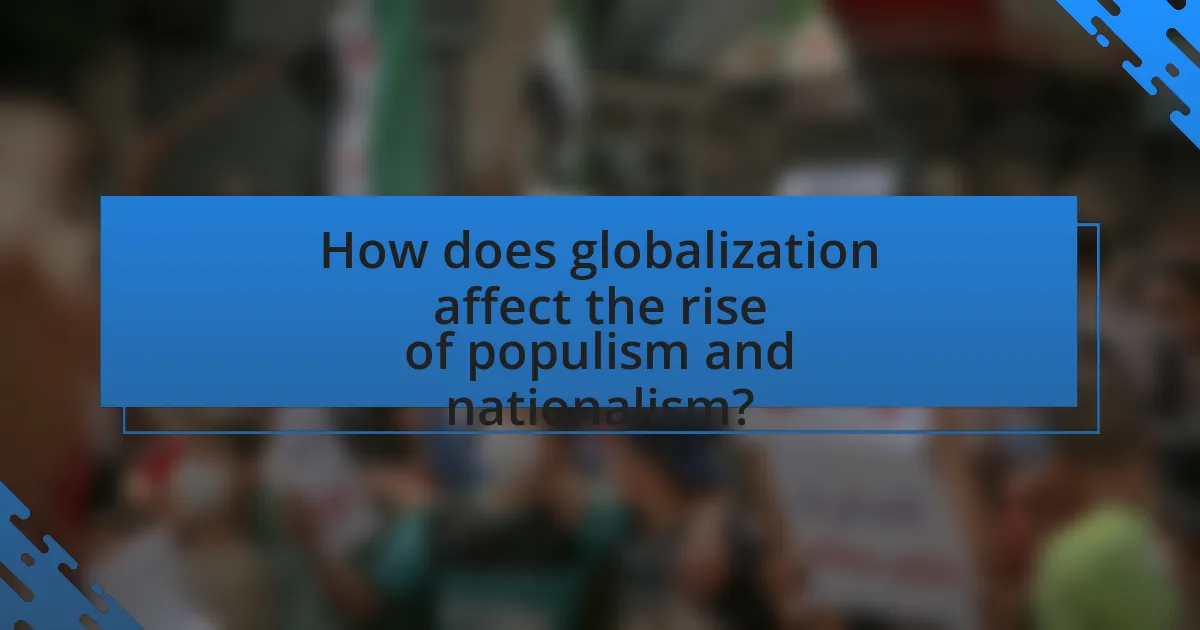
How does globalization affect the rise of populism and nationalism?
Globalization contributes to the rise of populism and nationalism by exacerbating economic inequalities and cultural anxieties. As global trade and migration increase, many individuals perceive a loss of jobs and cultural identity, leading to a backlash against established political elites. For instance, the 2016 Brexit vote in the United Kingdom and the election of Donald Trump in the United States exemplify how economic discontent and fears of cultural dilution can fuel populist sentiments. Research by the Pew Research Center indicates that in many advanced economies, a significant portion of the population feels that globalization has negatively impacted their economic situation, which correlates with increased support for nationalist and populist parties.
What are the causes of the rise of populist movements in a globalized world?
The rise of populist movements in a globalized world is primarily caused by economic inequality, cultural backlash, and political disillusionment. Economic inequality has intensified as globalization has led to wealth concentration among elites, leaving many feeling marginalized and economically insecure. For instance, the World Inequality Report 2022 highlights that the richest 10% of the global population owns 76% of total wealth, exacerbating feelings of disenfranchisement among the lower and middle classes.
Cultural backlash occurs as globalization promotes multiculturalism, leading some groups to feel threatened by changes in national identity and values. This is evident in the rise of nationalist sentiments in various countries, where populist leaders capitalize on fears of losing cultural heritage.
Political disillusionment stems from a perceived disconnect between traditional political parties and the electorate, as many voters feel their concerns are ignored. Research by the Pew Research Center in 2020 indicates that trust in government has declined significantly in many democracies, creating fertile ground for populist rhetoric that promises to restore power to the “common people.”
These interconnected factors contribute to the growing appeal of populist movements, which often position themselves as alternatives to the established political order.
How do economic disparities contribute to populism?
Economic disparities contribute to populism by creating a sense of disenfranchisement among economically marginalized groups. When wealth is concentrated in the hands of a few, those left behind often feel ignored by traditional political elites, leading to a rise in populist sentiments that promise to address their grievances. For instance, the 2008 financial crisis exacerbated economic inequalities, resulting in increased support for populist movements across various countries, as seen in the rise of leaders like Donald Trump in the United States and Brexit in the United Kingdom. These movements capitalize on the frustrations of those who perceive that globalization has disproportionately benefited the wealthy, thereby fostering a narrative that positions populist leaders as champions of the “common people” against the elite.
What role does cultural identity play in the rise of nationalism?
Cultural identity plays a crucial role in the rise of nationalism by fostering a sense of belonging and shared values among individuals within a specific group. This shared cultural identity often leads to the mobilization of people around common historical narratives, languages, and traditions, which can strengthen national unity. For instance, the resurgence of nationalist movements in various countries, such as the rise of Brexit in the United Kingdom, highlights how cultural identity can be leveraged to promote a narrative of sovereignty and distinctiveness against perceived external influences. Additionally, research by political scientists like Benedict Anderson in “Imagined Communities” emphasizes that nations are socially constructed communities, where cultural identity is fundamental in creating a collective consciousness that fuels nationalist sentiments.
How do global communication networks influence political ideologies?
Global communication networks significantly influence political ideologies by facilitating the rapid dissemination of information and ideas across borders. These networks enable diverse perspectives to reach a global audience, which can challenge traditional beliefs and promote new ideologies. For instance, social media platforms have played a crucial role in movements such as the Arab Spring, where citizens utilized these networks to organize protests and share democratic ideals, leading to shifts in political power and ideology in several countries. Additionally, studies show that exposure to global media can alter public perceptions and attitudes, as seen in the rise of progressive movements in various nations, driven by shared narratives and solidarity fostered through these communication channels.
What impact do social media platforms have on political discourse?
Social media platforms significantly influence political discourse by facilitating rapid information dissemination and enabling direct communication between politicians and the public. These platforms allow users to share opinions, mobilize support, and engage in discussions, which can shape public perception and political agendas. For instance, studies show that social media can amplify political polarization, as users often engage with like-minded individuals, reinforcing existing beliefs. According to a Pew Research Center report, 64% of Americans believe social media has a mostly negative effect on the way things are going in the country, highlighting concerns about misinformation and echo chambers.
How do information flows shape public opinion and political movements?
Information flows significantly shape public opinion and political movements by influencing the dissemination and reception of ideas, values, and narratives. The rapid spread of information through digital platforms allows for diverse viewpoints to reach a wide audience, often leading to shifts in public sentiment and mobilization around specific causes. For instance, the Arab Spring demonstrated how social media facilitated the organization of protests and the sharing of information, which galvanized public support against authoritarian regimes. Research by the Pew Research Center indicates that 64% of Americans believe social media has a major impact on political engagement, highlighting the role of information flows in shaping political landscapes.
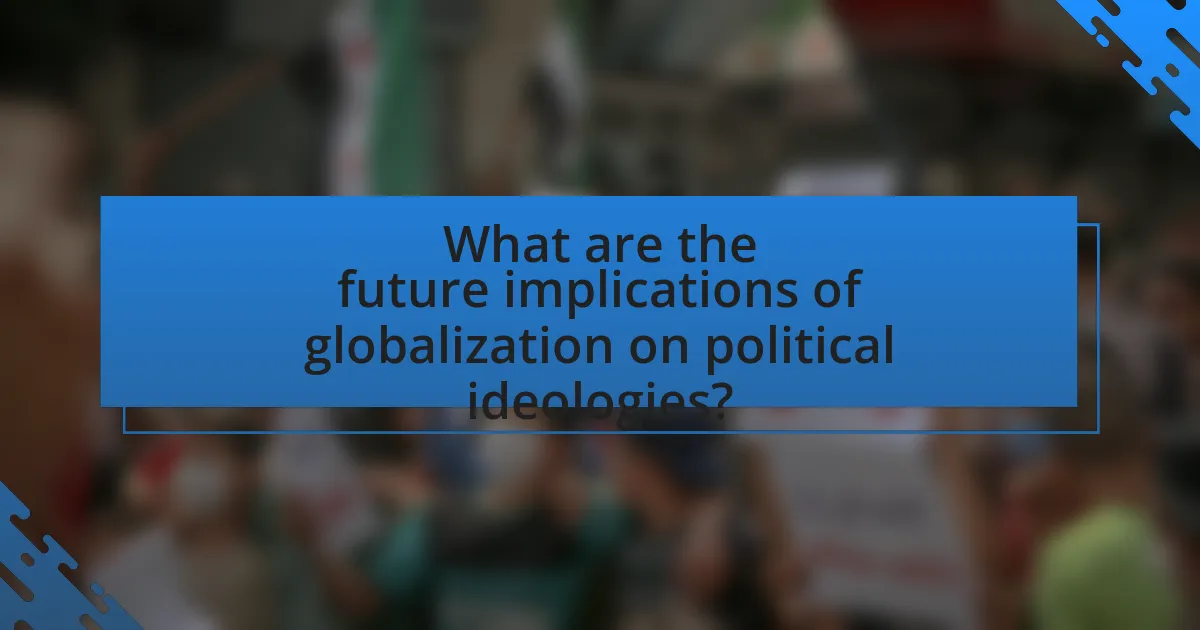
What are the future implications of globalization on political ideologies?
Globalization will increasingly lead to the convergence of political ideologies, as nations become more interconnected through trade, technology, and communication. This interconnectedness fosters the exchange of ideas and values, resulting in a blending of liberal democratic principles with elements of socialism and nationalism. For instance, the rise of global movements advocating for climate action has prompted traditionally conservative governments to adopt more progressive policies, reflecting a shift in ideological stances influenced by global consensus on environmental issues. Additionally, the proliferation of social media platforms facilitates the rapid spread of political ideas across borders, enabling grassroots movements to gain traction and challenge established political norms. This dynamic suggests that future political ideologies will be shaped by both local contexts and global influences, leading to hybrid models that reflect a diverse array of beliefs and practices.
How might political ideologies evolve in response to ongoing globalization?
Political ideologies may evolve towards greater inclusivity and adaptability in response to ongoing globalization. As nations become more interconnected, traditional ideologies face challenges from transnational issues such as climate change, migration, and economic inequality. For instance, the rise of populism in various countries reflects a reaction to perceived threats from globalization, prompting ideologies to incorporate elements that address local concerns while engaging with global dynamics. Additionally, the increasing influence of global civil society and international organizations encourages ideologies to adopt more cosmopolitan perspectives, emphasizing human rights and global governance. This evolution is evidenced by the growing prominence of green politics and social democracy, which seek to balance local interests with global responsibilities.
What trends are emerging in political thought due to technological advancements?
Emerging trends in political thought due to technological advancements include increased emphasis on digital democracy, the rise of populism, and the impact of social media on political discourse. Digital democracy is characterized by the use of technology to enhance citizen participation in governance, as seen in initiatives like e-voting and online petitions, which facilitate broader engagement. The rise of populism is fueled by technology enabling leaders to communicate directly with the public, bypassing traditional media, exemplified by figures like Donald Trump and Jair Bolsonaro who effectively utilized social media platforms to rally support. Additionally, social media has transformed political discourse by allowing rapid dissemination of information and mobilization of grassroots movements, as evidenced by the Arab Spring, where platforms like Twitter and Facebook played crucial roles in organizing protests. These trends reflect a shift in how political ideologies are formed and expressed in the digital age.
How can policymakers adapt to these changing ideological landscapes?
Policymakers can adapt to changing ideological landscapes by actively engaging with diverse stakeholder groups and incorporating their perspectives into policy development. This approach allows for a more inclusive understanding of the shifting values and beliefs within society, which is essential in a globalized context where ideologies are increasingly fluid. For instance, research by the Pew Research Center indicates that public opinion on issues such as immigration and climate change varies significantly across different demographics, highlighting the need for tailored policy responses that reflect these differences. By utilizing data-driven insights and fostering open dialogue, policymakers can create more effective and responsive policies that resonate with the evolving ideological sentiments of their constituents.
What strategies can be employed to navigate the impact of globalization on political ideologies?
To navigate the impact of globalization on political ideologies, strategies such as fostering inclusive dialogue, promoting local governance, and enhancing education on global interdependence can be employed. Inclusive dialogue allows diverse political perspectives to be heard, facilitating consensus-building in a globalized context. Promoting local governance empowers communities to address their unique challenges while aligning with global trends, thus preserving local identities. Enhancing education on global interdependence equips citizens with the knowledge to critically engage with global issues, fostering informed political discourse. These strategies are supported by research indicating that inclusive political processes and education can mitigate polarization and enhance democratic resilience in the face of globalization.
How can political leaders foster inclusive ideologies in a globalized context?
Political leaders can foster inclusive ideologies in a globalized context by promoting policies that prioritize social equity and cultural diversity. By implementing frameworks that encourage dialogue among various cultural and social groups, leaders can create environments where diverse perspectives are valued. For instance, countries like Canada have successfully integrated multicultural policies that recognize and celebrate diversity, leading to a more cohesive society. Additionally, leaders can utilize international platforms to advocate for human rights and social justice, reinforcing the importance of inclusivity on a global scale. This approach not only enhances domestic unity but also strengthens international cooperation, as seen in initiatives like the United Nations’ Sustainable Development Goals, which emphasize inclusivity as a key component of global progress.
What best practices can be adopted to address ideological conflicts arising from globalization?
To address ideological conflicts arising from globalization, fostering inclusive dialogue and promoting intercultural understanding are essential best practices. Inclusive dialogue involves creating platforms where diverse perspectives can be shared and respected, which helps mitigate misunderstandings and fosters collaboration. For instance, initiatives like the United Nations Alliance of Civilizations have successfully brought together different cultural and ideological groups to discuss and resolve conflicts. Promoting intercultural understanding can be achieved through educational programs that emphasize global citizenship and cultural awareness, as evidenced by UNESCO’s efforts to integrate global education into national curricula, which have shown positive impacts on reducing xenophobia and promoting tolerance. These practices not only address ideological conflicts but also build a foundation for cooperative global governance.
